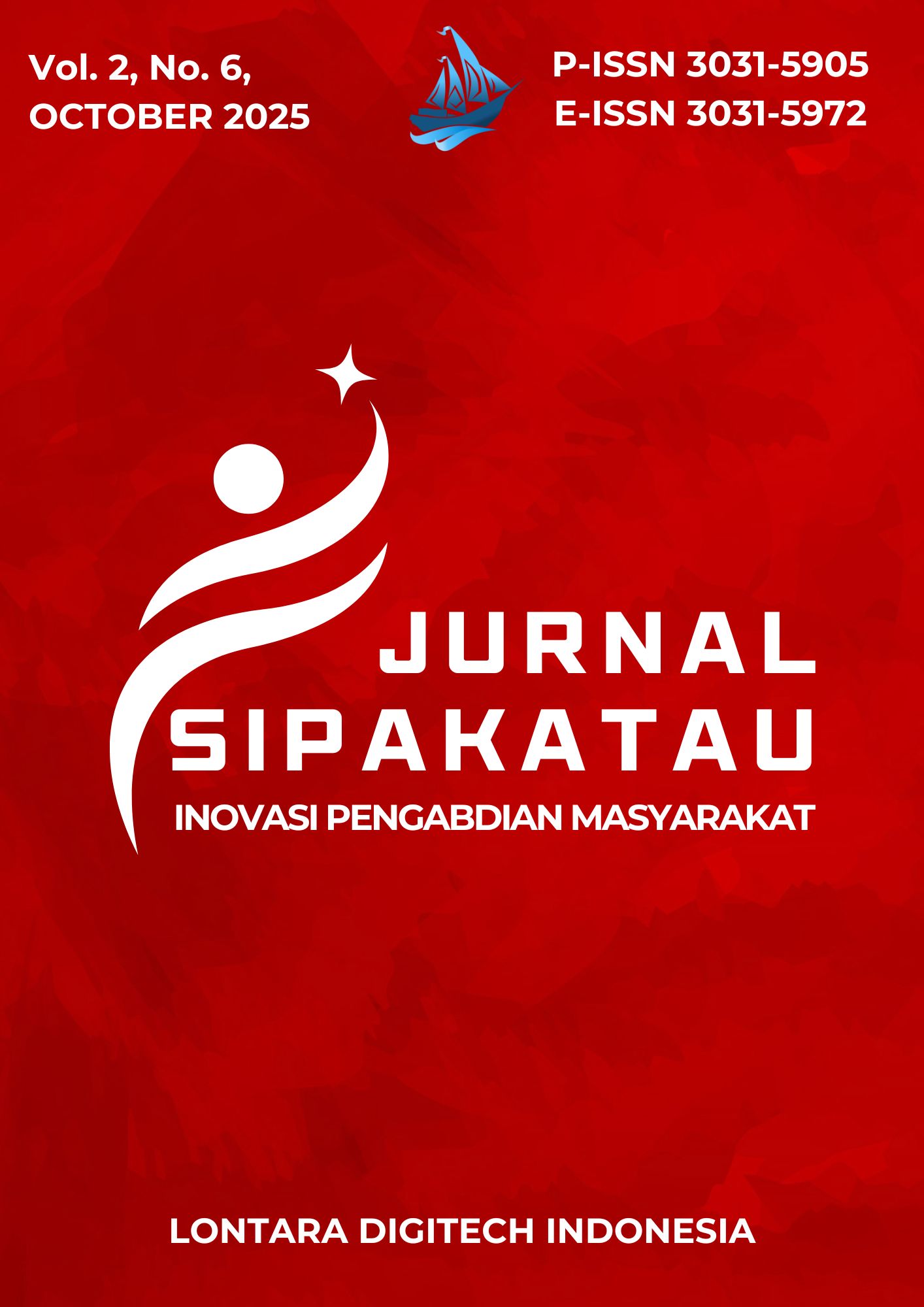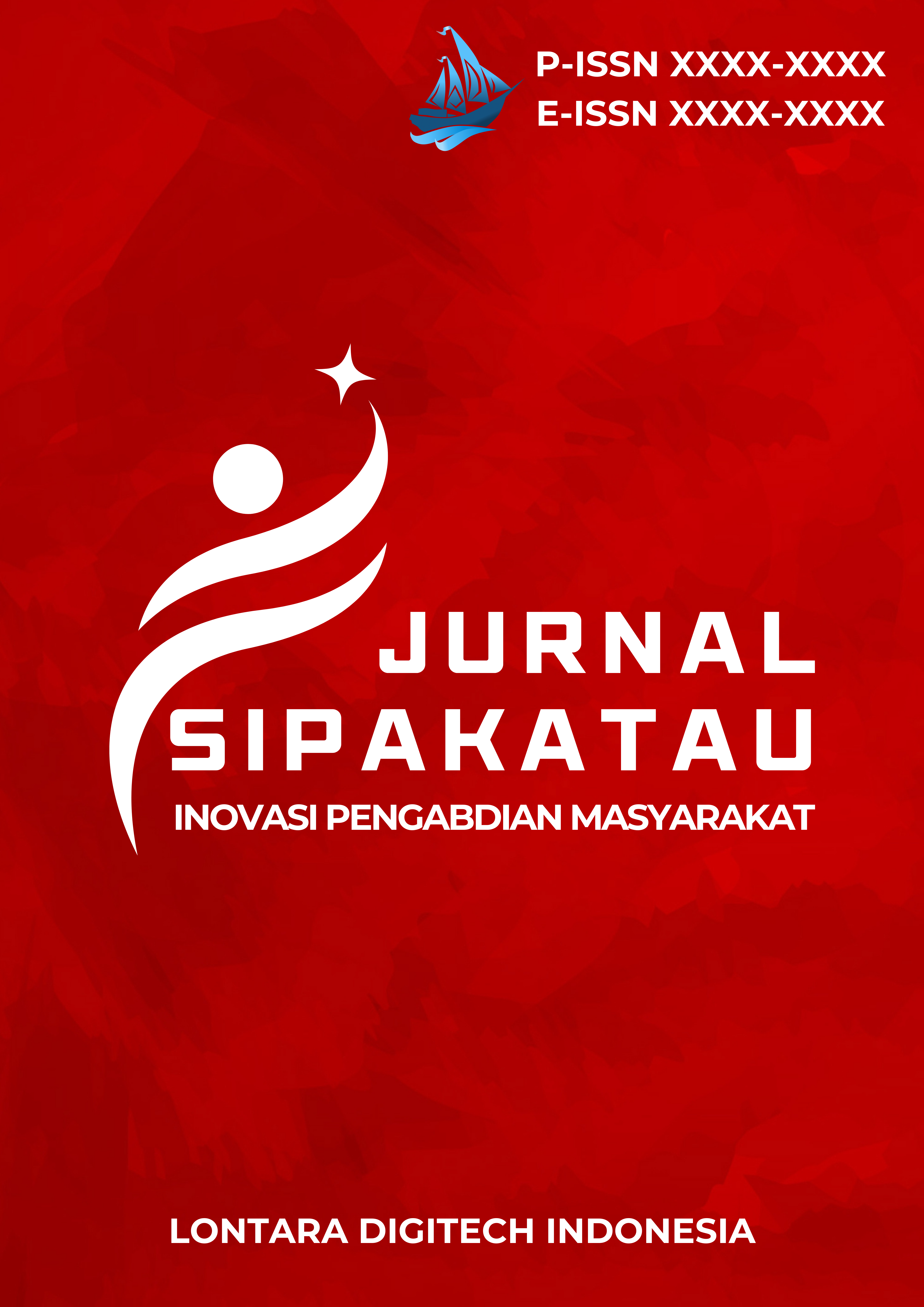Education on Women's Workers' Rights and Reproductive Health in Industrial Environments
DOI:
https://doi.org/10.61220/jsipakatau.v2i6.2535Keywords:
women workers, employment rights, reproductive health, industryAbstract
This community service program aims to improve women workers' understanding of labor rights and reproductive health in the industrial environment of Sidoarjo Regency, East Java. The method used was participatory action research (PAR) involving 80 core participants representing women's organizations, labor unions, and CSR units of local industrial companies. The activities were carried out through interactive lectures, group discussions, case simulations, and role-plays designed to address the limitations of legal and health literacy among women workers. The results of the activity showed a significant increase in participants' knowledge, from an average pre-test score of 56.4 to 87.6 in the post-test, an increase of 31.2 points. In addition, this activity also identified key issues, namely low understanding of labor rights, the lack of reproductive health facilities in the workplace, and the socio-cultural stigma that makes reproductive issues considered taboo. To ensure the program's sustainability, the Sidoarjo Women's Workers Forum was established as a cross-organizational advocacy platform focused on promoting workers' rights, advocating for the provision of lactation rooms, and strengthening gender advocacy units within labor unions. Overall, this activity successfully achieved more than 90% of its target outputs and made a significant contribution to the achievement of the Sustainable Development Goals (SDGs), particularly in the areas of gender equality and decent work. The implication of this activity is the need for similar programs to be replicated in other industrial areas with multi-stakeholder support to strengthen the protection of women workers' rights in Indonesia.
References
Anderson, R., Nugroho, A., & Park, S. (2025). Multi-Stakeholder Forums And Labor Rights Advocacy In Southeast Asia. Journal Of Industrial Relations, 67(1), 34–49. Https://Doi.Org/10.1177/00221856241234567
Arifin, Z., Wibowo, A., & Lestari, D. (2023). Corporate Social Responsibility And Employee Health Outcomes In Indonesian Manufacturing. Asia Pacific Journal Of Human Resources, 61(3), 421–439. Https://Doi.Org/10.1111/1744-7941.12312
Chalada, S., Nguyen, T., & Widodo, R. (2025). Menstrual Health Management In The Workplace: Evidence From Asia-Pacific. BMC Women’s Health, 25(1), 44–57. Https://Doi.Org/10.1186/S12905-025-02134-1
Dewi, H., & Syafruddin, M. (2021). Peer-To-Peer Learning As An Effective Method For Reproductive Health Education Among Women Workers. Health Education Research, 36(5), 535–548. Https://Doi.Org/10.1093/Her/Cyab017
Dewi, K. R., & Astuti, R. (2021). Workplace Reproductive Health Programs And Their Impact On Female Workers’ Productivity In Indonesia. International Journal Of Workplace Health Management, 14(5), 457–471. Https://Doi.Org/10.1108/IJWHM-03-2021-0049
Fitriani, N., & Handayani, R. (2022). Women Workers’ Rights And The Challenges Of Labor Law Implementation In Indonesia. Journal Of Industrial Relations And Human Resource Management, 24(2), 89–104. Https://Doi.Org/10.1177/09500170221082064
Handayani, R., & Hidayat, A. (2019). Gendered Labor Conditions And Reproductive Health Challenges Among Women Workers In East Java. Kesmas: National Public Health Journal, 14(4), 175–182. Https://Doi.Org/10.21109/Kesmas.V14i4.3372
Hill, C., Purwanto, H., & Yusuf, D. (2023). Gender Bias And Structural Inequality In Indonesian Labor Markets. Gender, Work & Organization, 30(4), 1289–1302. Https://Doi.Org/10.1111/Gwao.13025
Howe, L., Suryani, E., & Collins, J. (2023). Fiscal Feasibility Of Maternity Protection In Indonesia: Policy Modeling Study. Health Policy And Planning, 38(2), 145–156. Https://Doi.Org/10.1093/Heapol/Czad009
Kurniasari, R., Putra, Y., & Malik, A. (2020). Psychosocial Determinants Of Reproductive Health Compliance Among Female Factory Workers. BMC Public Health, 20(1), 1558–1567. Https://Doi.Org/10.1186/S12889-020-09632-4
Martiana, T., Setyowati, H., & Pranata, Y. (2024). Occupational Risk Factors And Menstrual Health Among Female Factory Workers In East Java. International Journal Of Environmental Research And Public Health, 21(6), 789–803. Https://Doi.Org/10.3390/Ijerph21060789
Mulyani, S. (2021). Gender-Based Discrimination And Awareness Of Labor Rights Among Female Workers In East Java Industries. Journal Of Gender Studies, 30(7), 854–869. Https://Doi.Org/10.1080/09589236.2021.1891493
Ningsih, S., & Prabowo, H. (2022). Digital Communication Strategies For Labor Rights Awareness In Indonesia. Information Development, 38(4), 614–623. Https://Doi.Org/10.1177/02666669221083256
Nugroho, A., Santosa, T., & Lestari, D. (2021). Workplace Support For Female Workers: Reproductive Health And Absenteeism Reduction. Journal Of Occupational Health, 63(1), E12223. Https://Doi.Org/10.1002/1348-9585.12223
Nurhidayati, S. (2021). Implementasi Hak Cuti Haid Pada Pekerja Perempuan Di Kawasan Industri Jawa Timur. Jurnal Hukum Dan Pembangunan, 51(3), 621–640. Https://Doi.Org/10.21143/Jhp.Vol51.No3.3030
Pratiwi, A., & Wibowo, H. (2019). Community-Based Education Model For Improving Female Workers’ Awareness On Reproductive Health. Asian Social Science, 15(6), 110–120. Https://Doi.Org/10.5539/Ass.V15n6p110
Putri, D. A., & Astuti, S. (2020). Patriarchy And Reproductive Health Discourse In Industrial Workplaces. Jurnal Kesehatan Reproduksi, 11(2), 105–114. Https://Doi.Org/10.22435/Kespro.V11i2.3956
Rahayu, D., Putri, F., & Kurniawan, B. (2021). Women In Industrial Labor: Legal Protection And Workplace Challenges. Journal Of Law And Development Studies, 9(3), 201–215. Https://Doi.Org/10.15294/Jlds.V9i3.47892
Rahman, A., Kusuma, H., & Dewi, N. (2020). Gender Discrimination And Workplace Rights In Indonesian Industrial Sectors. Asian Journal Of Women’s Studies, 26(2), 187–203. Https://Doi.Org/10.1080/12259276.2020.1760567
Rahman, F. (2022). Gender Discrimination And Job Security For Female Workers In East Java’s Industrial Sector. Journal Of Workplace Rights, 27(1), 55–72. Https://Doi.Org/10.1177/21582440211069871
Razafimahefa, L., Nurlina, S., & Kim, J. (2022). Corporate Social Responsibility And Gender Inclusivity In Southeast Asia. Social Responsibility Journal, 18(5), 1021–1037. Https://Doi.Org/10.1108/SRJ-12-2020-0485
Salsabila, R., & Kurniawan, A. (2023). Gender Mainstreaming In Local Labor Policies: Evidence From Sidoarjo Regency. Indonesian Journal Of Gender Studies, 8(1), 33–47. Https://Doi.Org/10.24843/Ijgs.2023.V08.I01.P04
Sari, P. W., & Widyastuti, E. (2020). Reproductive Health Knowledge And Its Effect On Female Workers’ Performance In Manufacturing Industries. BMC Women’s Health, 20(1), 256–264. Https://Doi.Org/10.1186/S12905-020-01112-3
Setiawan, I. (2020). Corporate Social Responsibility And Gender Equality In Indonesian Manufacturing Industries. Social Responsibility Journal, 16(8), 1190–1206. Https://Doi.Org/10.1108/SRJ-02-2019-0071
Siregar, F., Aisyah, N., & Hidayat, M. (2021). Multi-Level Strategies For Improving Women’s Reproductive Health In Industrial Zones. Reproductive Health, 18(1), 211–223. Https://Doi.Org/10.1186/S12978-021-01211-7
Vilar-Compte, M., Teruel, G., & Flores, D. (2021). Workplace Interventions To Improve Reproductive Health: A Systematic Review. International Journal Of Environmental Research And Public Health, 18(3), 1024–1039. Https://Doi.Org/10.3390/Ijerph18031024
Wardhani, S., & Nugroho, P. (2019). Gender Equality And Labor Law Enforcement In Indonesia. Indonesian Journal Of Law And Society, 10(2), 215–229. Https://Doi.Org/10.19184/Ijls.V10i2.12567
Widjaja, T., Susilo, D., & Hartono, P. (2024). Gender Equality Programs And Their Contribution To Sdgs In Southeast Asia. Journal Of Sustainable Development, 17(2), 87–102. Https://Doi.Org/10.5539/Jsd.V17n2p87
Wulandari, P., Prabowo, T., & Nugrahani, L. (2022). Corporate Social Responsibility And Women’s Reproductive Health: A Study In Sidoarjo Industrial Area. Social Responsibility Journal, 18(7), 1345–1361. Https://Doi.Org/10.1108/SRJ-05-2021-0219
Published
Issue
Section
License
Copyright (c) 2025 Rifki Suwaji, Rina Indra Sabella, Fida Oktafiani, Waloyo, Siti Masruroh (Author)

This work is licensed under a Creative Commons Attribution-ShareAlike 4.0 International License.
















 Email: sipakatau@lontaradigitech.com
Email: sipakatau@lontaradigitech.com
